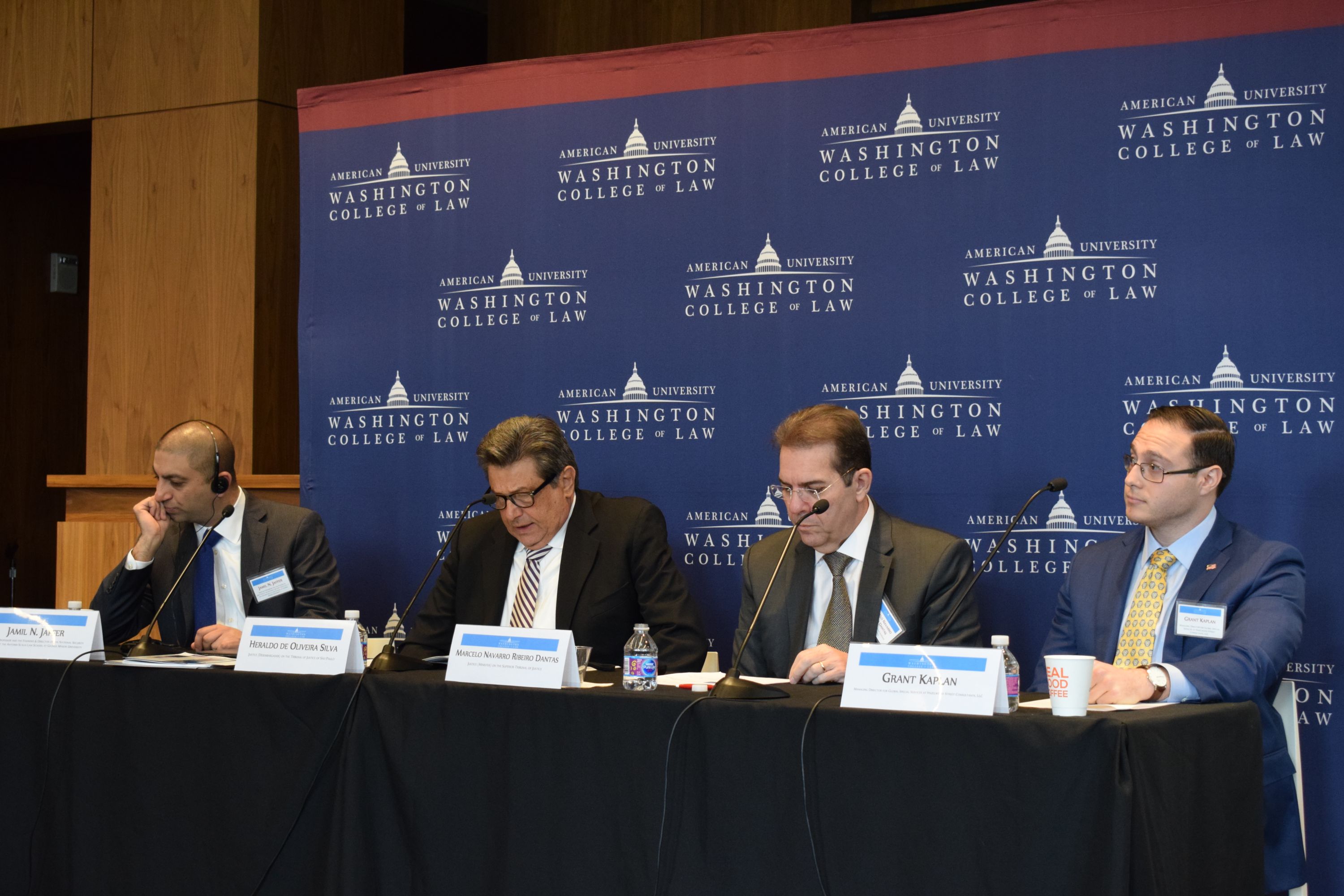
AUWCL Hosts Sixth Annual Conference of Brazilian and American Judges: Symposium on the Economic Analysis of Law
On February 27-28, the Brazil-U.S. Legal & Judicial Studies Program at AUWCL held its Sixth Annual Symposium for High Court Judges and Government Officials from Brazil. This year’s topic was Economic Analysis of Law. Senior U.S. District Court Judge Peter J. Messitte, Adjunct Professor of Comparative Law and Director of the Brazil-U.S. Program at AUWCL, hosted the program and acted as Moderator. This Symposium was also coordinated with the Justice & Citizenship Institute of Brazil, the Antonin Scalia Law School at George Mason University, and Judge Valter Shuenquener de Araujo, Federal Judge and Professor of Law in Brazil.
Among the distinguished Brazilian participants in the Symposium were Minister Luiz Fux, Vice President of the Supreme Federal Tribunal of Brasilia, and Dr. Wilson Witzel, Governor of the State of Rio de Janeiro and a former Federal Trial Judge. They were joined by equally distinguished jurists: Minister João Otávio de Noronha, President of the Supreme Tribunal of Justice, Brazil’s highest non-constitutional court, and several of Ministers of the Court including Luis Felipe Salomão, Paulo Sanseverino, and Ricardo Cueva.
Minister Fux began the symposium with a general discussion of what economic analysis of law means – applying a cost-benefit analysis to given laws in order to accomplish the delivery of justice through the most efficient means. Professor and Vice Dean Antonio from the Getulio Vargas Foundation School of Law in Rio also delivered his perspective on the efficiencies of the practice of law.
Over the course of two days several topics were discussed from the standpoint of Economic Analysis: Law, Public Security and Development, Government Regulation; Alternative Dispute Resolution; Compliance with Anti-Corrupt Law Tariffs; Anti-trust; Agricultural Tariffs; Cybersecurity; Water Resources and Management and Government; and Accountability; and Real Estate and Shopping Centers.
One of the more salient topics included addressing law, public security, and development, which was discussed by Governor Witzel of Brazil. He offered a wide-ranging perspective on initiatives that he believed could not only be employed to combat crimes but which could lead to a better society generally. Professor Scott Farrow, Professor Emeritus of Economics at the University of Maryland Baltimore County, responded with helpful insights.
A second topic, water resources allocation and economic development, was a particularly relevant and interesting topic for this year’s Symposium. Rio de Janeiro is suffering a severe water crisis, both in terms of pollution and lack of potable water available. Rita Cestti, Practice Manager of the Water Global Practice for Latin America and the Caribbean at the World Bank, addressed the topic. Ms. Cestti, a Peruvian citizen, had previously worked on water resource projects in Brazil. She compared those undertakings in Brazil with similar projects throughout Latin America, and made several suggestions with respect to Rio’s current water crisis. Dr. Cestti strongly recommended further World Bank technical and financial assistance for water projects in Brazil.
In addition, the topic of government accountability was discussed at large during the symposium, addressing in particular the economic analysis of government spending, and activities of specialized arms of government to assure government agencies comply with the law operate efficiently. Comptroller General of the United States, Gene Dodaro, provided a summary of the Government Accountability Office and its functions. Responding to the Comptroller General’s presentation was Dr. Wagner Rosario of Brazil, whose position under the Brazilian Executive Branch monitors government spending and efficiencies. His remarks highlighted a number of similarities with the U.S. Government Accountability Office and the Tribunal of Accounts in Brazil. The Tribunal of Accounts, the Brazilian government entity that monitors accountability, is a court that hears cases regarding government spending and renders decisions on behalf of the Brazilian Congress.
AUWCL’s relationship with the Brazilian Judiciary continues to be unique – both in the U.S. and in the world, and looks forward to continued dialogue and progress.